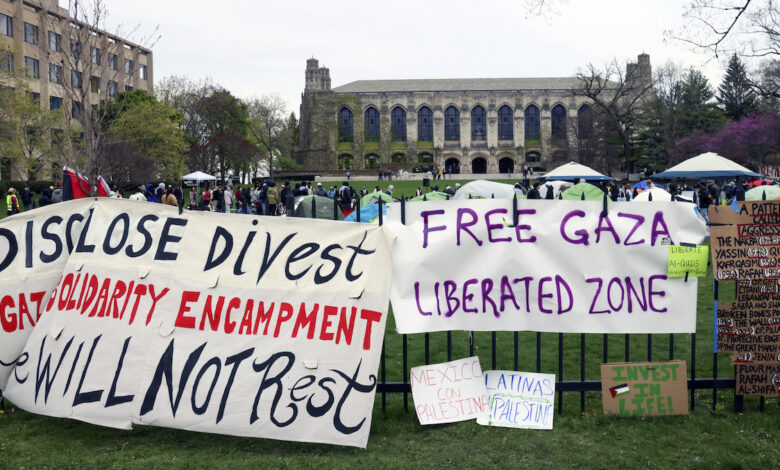San Francisco University divests from companies weaponizing Israel.

San Francisco State University in California has decided to divest from four companies profiting from the Gaza war: Palantir Technologies, Lockheed Martin, Leonardo, and Caterpillar, due to pressure from Palestinian rights activists in the United States. People greeting this step call it and other activists’ success in the wake of a rising crackdown on pro-Palestinian sentiment by universities and social media companies.
This historic ruling arrived at the right time, given that universities nationwide are increasingly cracking down on Palestinian solidarity activism. In the recent past, NYU classified the criticism of Zionism as hate speech, which will prevent activism. Likewise, this year, the University of Michigan students witnessed violent arrests while protesting in a sit-in against the actions of Israel.
The group that is spearheading the divestment campaign is Students for Gaza SFSU activists, which have demanded that the university cut all its ties with companies that fund Israeli Defense Forces operations against Palestinians. This call was one in a series of demands made by the same national campaign putting pressure on universities to divest from Companies involved in the Israeli occupation and its attack on Gaza.
Noam Perry, the directorate strategic research coordinator of the American Friends Service Committee (AFSC), and Brad Parker, international boycott coordinator at the AFSC, appreciated the move by SFSU. He pointed out that not only has the university sold its shares in these four companies, but it has also established a new ethical investment policy. This policy will also vet any future investment through a human rights lens, preventing the university from investing in such companies.
As Perry showed, this process can be considered one of the most sincere actions of a U.S. university in response to student demands for divestment. The university’s new policy is linked to its willingness to invest ethically and respect the students’ concerns.
On Thursday, Students for Gaza demanded divestment at a press conference and rally at Malcolm X Plaza. The event was successful, marking their campaign achievement and continuing the fight for Palestinians’ rights.
The divestment decision came after much pressure was mounted for many months. In the spring, Students for Gaza occupied space in SFSU to force the university to divest from firms involved in the war on Gaza. The encampment lasted for three weeks, and during the struggle, the university agreed to public negotiations, which had not been practised before by any U.S. university.
These negotiations created a summer working group of AFSC students, faculty, and community partners. This group revised the university’s general investment policies and consequently decided to disinvest from Lockheed Martin, Leonardo, Palantir Technologies, and Caterpillar based on violations of human rights principles.
Several arms makers, such as Lockheed Martin, a weapons producer that delivers aircraft to the Israeli defence force, and Leonardo, an Italian defence firm that has equipped the Israeli navy with weaponry. Some of the accused partners have been involved with the very act: Palantir Technologies has been assisting in drawing up “kill lists” for operations by the Israeli military; Caterpillar has its bulldozers employed in the dismantling of Palestinian homes and infrastructure alike, including during the current invasion of Gaza.
However, as Perry and other activists affirm, such a victory has been considerably won, and more has to be done. Next, at SFSU, the new investment policy will also be about race and justice, human rights, and environmental concerns. The perception is to provide a rational structure through its integrated approach to maintain the University’s investments as an ethical endeavour.
With the situation in Gaza unfolding, the SFSU decision was a critical turning point for the student-organized divestment campaign and an example to be replicated by other institutions. Demand for boycotts and socially responsible investment is expected to remain high, in line with rising pressure to compel companies into disentanglement from various wars and human rights abuses.




